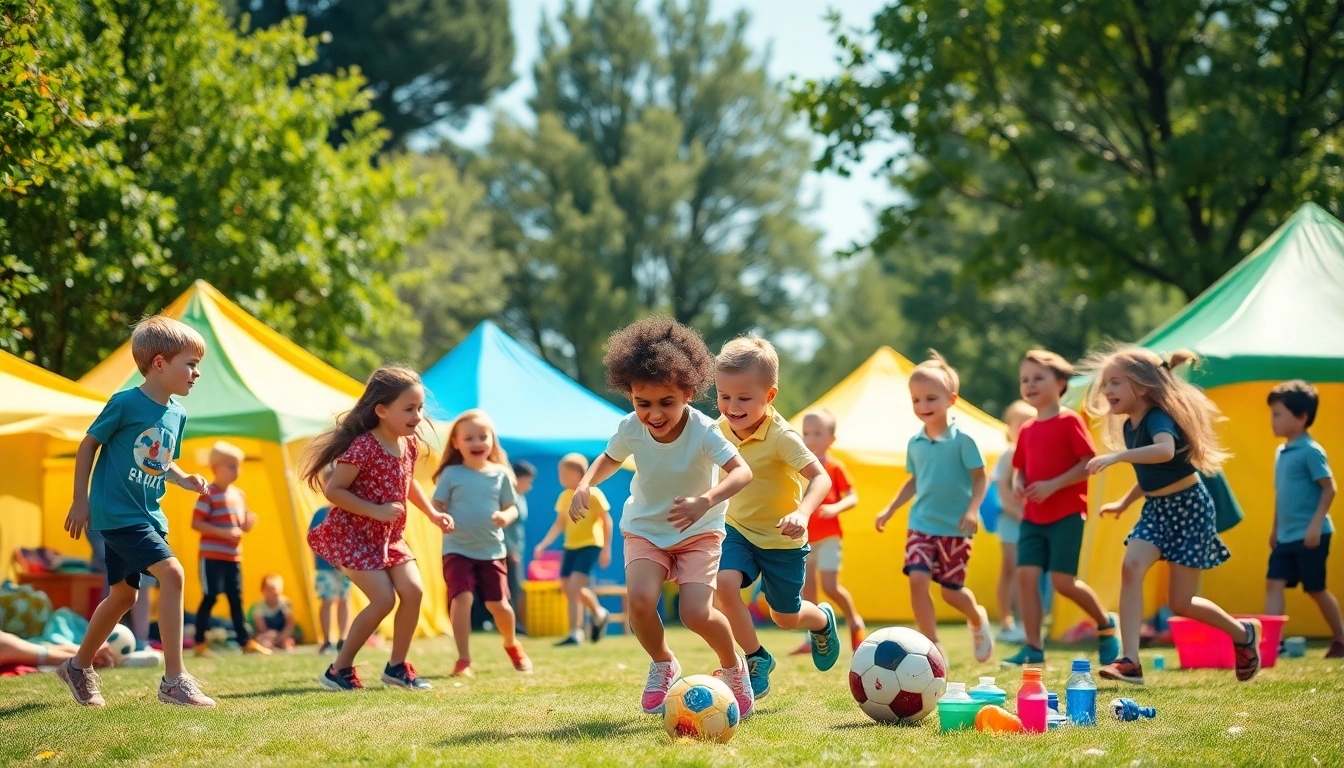Understanding the Benefits of Holiday Camps
Holiday camps offer an enriching experience for children, filled with opportunities for growth, adventure, and socialization. These camps can be life-changing for young attendees, enhancing their skills, fostering new friendships, and providing them with a sense of independence. As parents look for summer experiences that are not only entertaining but also educational, holiday camps present an excellent option. But what exactly makes these camps such a popular choice among families?
Why Parents Choose Holiday Camps
Parents are often driven by multiple factors when selecting holiday camps for their children. First and foremost, there is the desire for enriching experiences that extend beyond the classroom setting. Holiday camps allow children to experience new activities, develop skills, and meet peers outside of their usual social circles. Additionally, many parents appreciate that these camps provide structured environments that blend fun and education, giving them peace of mind while their children are engaged in positive activities.
Safety is another critical reason for parents to choose holiday camps. Many camps prioritize children’s security by implementing rigorous safety protocols, including background checks for staff, first-aid training, and emergency preparedness plans. This commitment to safety can alleviate concerns parents might have about leaving their children in unfamiliar settings.
Key Skills Developed at Holiday Camps
Holiday camps are designed to foster a variety of skills that children can utilize throughout their lives. Critical thinking and problem-solving abilities often come into play during team games and activities. Furthermore, many camps promote creativity through arts and crafts sessions, enabling children to express themselves and think imaginatively.
Physical skills are also a significant focus at many holiday camps. From sports camps that teach various athletic pursuits to adventure camps that promote outdoor skills such as hiking and climbing, children gain not only fitness but also resilience and a sense of accomplishment.
Social Interaction and Team Building
One of the most substantial benefits of attending holiday camps is the opportunity for social interaction. Children often form friendships that can last a lifetime as they encounter new experiences together. These camps provide a unique social setting where children from different backgrounds can come together, fostering empathy and understanding.
Moreover, many camp activities are designed to promote teamwork. Group challenges, sports, and collaborative projects encourage children to communicate effectively, resolve conflicts amicably, and learn the importance of cooperation. Such skills are not only essential for success at camp but will serve them well in future academic and social endeavors.
Types of Holiday Camps Available
With a diverse range of holiday camps available, parents can find the perfect fit for their child’s interests and personality. These camps cater to various needs, from sports and adventure to arts and academics.
Sports and Adventure Holiday Camps
Sports and adventure camps are among the most popular choices for active children. Typically, these camps combine physical challenges with skill development in specific sports, including soccer, basketball, swimming, and more. In addition to sports, many adventure camps introduce children to outdoor activities such as rock climbing, zip-lining, and canoeing which can help them build confidence and resilience.
These camps often emphasize the importance of teamwork and sportsmanship, teaching children to work together towards common goals while celebrating each other’s achievements.
Arts and Creative Holiday Camps
For children inclined towards the arts, creative holiday camps offer endless possibilities for self-expression. From painting and sculpture to music and drama, these camps encourage children to explore their artistic abilities while learning new techniques and skills. Participating in productions or showcases helps boost their confidence, and gaining feedback from peers and instructors fosters growth in their craft.
Moreover, arts camps often integrate disciplines, such as combining visual arts with storytelling, allowing children to engage in multidisciplinary exploration that bolsters their creativity and critical thinking.
Academic and Specialty Holiday Camps
Academic camps focus on enhancing skills in specific subjects such as science, mathematics, and language arts. They may include hands-on experiments in labs, interactive storytelling workshops, or coding and robotics sessions, all designed to keep students engaged while reinforcing learning concepts. These specialized sessions can be invaluable for children seeking to gain an edge in school or explore a passion in depth.
Additionally, specialty camps may focus on unique interests, such as cooking, coding, or environmental stewardship, catering to children’s diverse passions and career aspirations.
What to Look for in Holiday Camps
Choosing the right holiday camp is crucial for ensuring a positive experience for children. Parents should consider various factors when evaluating their options to ensure they make an informed decision.
Safety and Staff Qualifications
One of the primary concerns for parents is safety. Before enrolling their child in a camp, parents should investigate the safety measures that the camp has in place. This may include staff-to-child ratios, training programs for counselors, and emergency protocols. Additionally, certified staff with backgrounds in child development or education can significantly enhance the camp experience.
Camp Activities and Curriculum
Each camp offers a unique blend of activities. Parents should ensure that the activities align with their child’s interests and are age-appropriate. A well-structured curriculum that balances fun with educational elements promotes engagement and learning. Parents can also look for camps that encourage creative freedom and allow children to choose some of their activities.
Location and Facilities
The location of the camp can impact the experience. Proximity to home can be an advantage for younger children or those new to the camp experience. Parents should consider the facilities available at the camp, such as lodging, dining options, and recreational areas, ensuring they meet their child’s needs for comfort and safety.
Preparing for Your Child’s Holiday Camp Experience
Successful preparation can significantly enhance a child’s camp experience. Engaging children in the planning process can increase their excitement and decrease anxiety about the upcoming adventure.
Essential Items to Pack for Holiday Camps
Parents should prepare a checklist of essential items their child will need during camp. This may include clothing suitable for various weather conditions, comfortable shoes, toiletries, and any specific gear needed for camp activities such as swimming or sports. Providing children with a sense of ownership over their packing can help them feel more comfortable and confident as they head into their camp experience.
How to Discuss Camp Expectations with Your Child
Communication is key when preparing children for their first camp experience. Parents should set aside time to discuss what the child can expect, including daily routines, activities, and social situations. Sharing stories or experiences from their camp can help children understand what to anticipate, alleviating some anxiety they may feel. Encouraging children to express their thoughts and feelings about the upcoming camp experience can also be beneficial.
Importance of Pre-Camp Visits
For some camps, visiting the campgrounds before the actual start date can be a great way to prepare. Pre-camp visits allow children to familiarize themselves with the environment, meet some of the counselors, and recognize the activities they will be participating in. This exposure can instill confidence and excitement, making the transition smoother when camp begins.
Evaluating the Impact of Holiday Camps on Development
After camp concludes, assessing the experience can provide insights into the benefits it has offered. Understanding how holiday camps affect personal development enhances the value placed on future camp experiences.
Measuring Growth and Success Post-Camp
Parents can gauge the growth and success of their child’s camp experience through various measures. Observations regarding their child’s newfound skills, confidence, and social interactions can serve as indicators. Feedback from the child about their experiences and learnings can also provide valuable information for evaluating the overall success of the camp.
Emotional and Behavioral Changes After Holiday Camps
Participation in holiday camps can lead to notable emotional and behavioral changes. Many children exhibit increases in self-esteem and social skills after their camp experiences. Parents may notice that their children are more open to trying new activities or engaging with peers after attending camps, which can be attributed to the encouraging environment that camps often provide.
Long-Term Benefits of Attending Holiday Camps
While the immediate outcomes of holiday camps are evident, the long-term benefits can be even more significant. Skills learned and friendships made during camp can shape a child’s social development and career interests. Moreover, the independence gained while navigating new challenges at camp can inspire resilience and adaptability that last well into adulthood.
In conclusion, holiday camps offer children essential experiences that contribute to their personal growth. These camps not only provide fun and opportunities for adventure but also build foundational life skills that children can carry with them for years to come.



